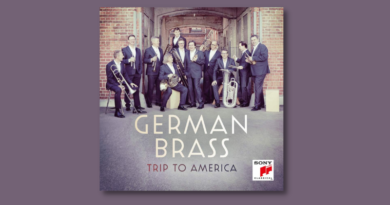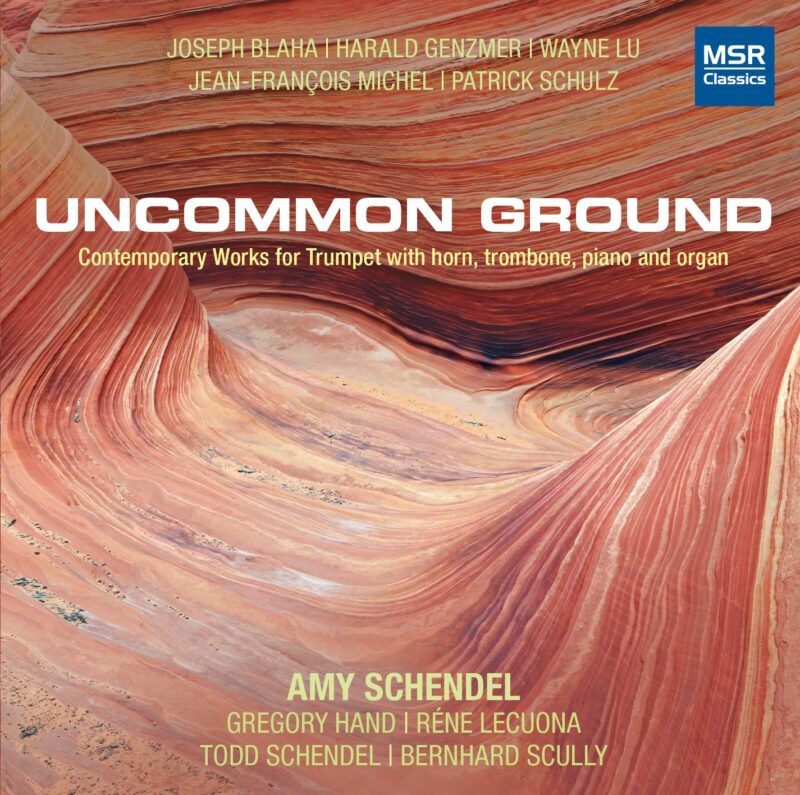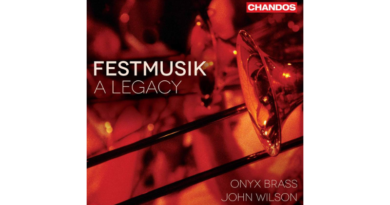Tetra Brass Set To Release Album of Music by Glazunov and Simon
Quatuor will be released on November 22, 2024, on simoc records.
The Russian Aleksandr Glazunov (1865-1936) began composing as a child and completed his first symphony at the age of 16. His patron Nikolai Rimsky-Korsakov reported that Glazunov developed a greater interest in brass instruments from 1885 onwards. He took lessons on various instruments himself and also composed several pieces for quartets in the process, having concentrated mainly on orchestral works until then. A few years before his appointment to the St. Petersburg Conservatory, Aleksandr Glazunov composed the work In Modo Religioso (1886) for four brass instruments, which is presented on Quatuor.
Glazunov’s interest in wind instruments coincided with the endeavours of Russia’s musical culture and the enthusiasm for ‘cutting-edge technology’ around this time, which fuelled the interest in brass instruments. Their development progressed rapidly. The founding of the influential Russian Musical Society in 1859 by Anton Rubinstein and Grand Duchess Yelena Pavlovna was followed by the establishment of the St. Petersburg Conservatory in 1862. Tsar Alexander II even sent Rubinstein to Vienna to acquire wind and brass instruments from renowned manufacturers for his new school and set in motion an imperial decree to establish a uniform tuning standard throughout the empire.
It is assumed that although Glazunov had previously known chamber music works for brass, he was not directly associated with them. His contemporary Anton Simon (1850-1916), who came from France and emigrated to Russia in 1870, had a different background in the chamber music tradition and found fertile ground for his brass music in his adopted country. This flourished in Russia, which was inspired by European chamber music culture in the late 19th century. Simon quickly built up a career in his new homeland. He wrote numerous chamber music works for brass, which were published in Warsaw as well as in Moscow and St. Petersburg by the most important Russian publisher of his time, P. Jurgenson.
‘It is astonishing that the fine, nuanced soundscapes of Romantic chamber music works for smaller brass ensembles have been almost completely forgotten,’ remarks bass trombonist Jakob Grimm. ‘In contrast, the powerful, voluminous orchestral ensembles of the 19th and early 20th centuries have had a decisive influence on the sound culture of brass instruments today, so that our sound aesthetics are deeply rooted in the large orchestral brass ensemble. Discovering the differentiated sound world of Simon’s ‘Quatuor’ and Glazunov’s narrative ‘In Modo Religioso’ gives me personally great pleasure!’
The Quatuor en forme de sonatine presented here is Simon’s largest chamber music work for brass. Rooted in the Romantic tradition – Simon orientated himself on the school of the great Romantic composer Tchaikovsky, among others – it thrives on the variety of articulation and its subtle dynamics. ‘I am fascinated by the impressive way in which Anton Simon manages to transfer the roles of a string quartet to four brass players,’ says trumpeter Aljoscha Zierow. ‘He takes great care to ensure that each phrase can be played optimally on the brass instruments and utilises the pairing of two trumpets and two trombones in an elegant way. What I find particularly appealing is the deep, Eastern European melancholy that resonates in both pieces and lends the whole an emotional depth.’

Tetra Brass
Luca Chiché | trumpet
Aljoscha Zierow | trumpet
Christian Traute | trombone
Jakob Grimm | trombone
Founded in 2018, the brass quartet Tetra Brass delights audiences with its warm, refined sound, special performance power and innovative programme ideas. Invitations have taken the quartet to concert halls such as the Wigmore Hall London, the Philharmonie Berlin, the Solti Hall Budapest, Santa Croce Florence, the Bern Conservatory, the Lindeman Hall Oslo, the Grafenegg Riding School and the Isarphilharmonie Munich.
Tetra Brass has performed at the Grafenegg Festival, the Detect Classic Festival, the Wege durch das Land Festival, the Mizmorim Chamber Music Festival and the Eigenzeit Festival of the Duisburg Philharmonic Orchestra with programmes designed for the respective concert venues. Radio features and live programmes with and about the ensemble have been broadcast by WDR 3, BR Klassik and BBC radio 3, among others.
In the 20th Chieri International Competition (Italy), Tetra Brass was awarded 1st prize ‘Primo Premio Assoluto’ with the highest score. The ensemble received further 1st prizes in international competitions at the II International Viennese Spring Music Competition, the IMC – International Music Competition Paris, the 7th Rising Stars Grand Prix – International Music Competition Berlin and the VRŠAC International Chamber Music Competition (Serbia). In 2023, the ensemble was also awarded the City of Munich Music Prize.
The quartet studied chamber music in the class of Raphaël Merlin and Reto Bieri at the Munich University of Music and Theatre. At the FHNW Basel, the musicians honed their skills in the interpretation of contemporary chamber music with Mike Svoboda and Marcus Weiss. As a member of the European Chamber Music Academy (ECMA), Tetra Brass is part of a lively network for the exchange of a European chamber music tradition. The four musicians have been influenced by Hatto Beyerle, Minna Pensola, Johannes Meissl, Karla Haltenwanger and Patrick Jüdt.
As ambassadors of Buffet Crampon, Tetra Brass plays exclusively on instruments by Antoine Courtois.
TETRA BRASS
Quatuor
Release date: November 22nd, 2024, EP
Label: simoc records
Article nr: LC 100780
Source: Kristina Patzelt




